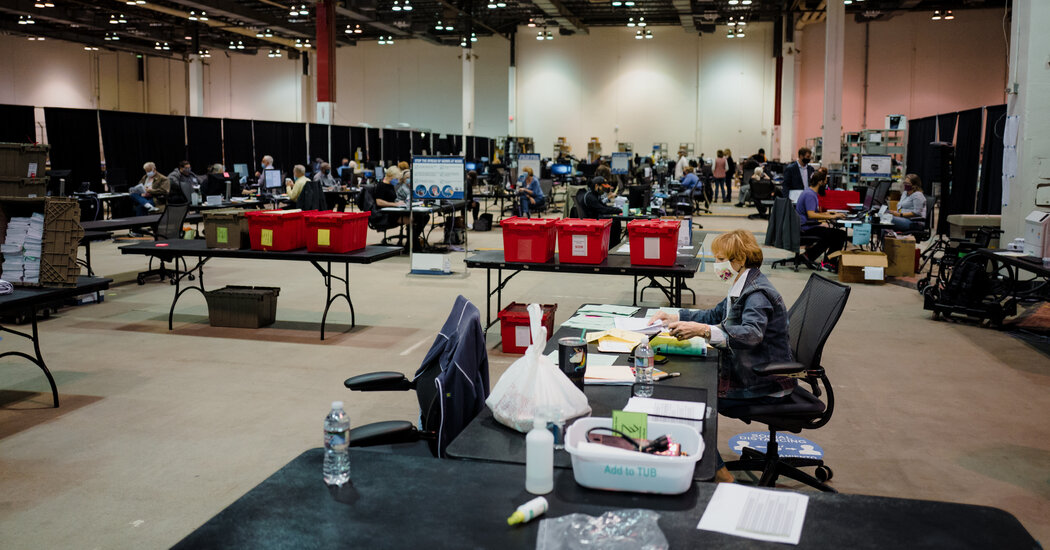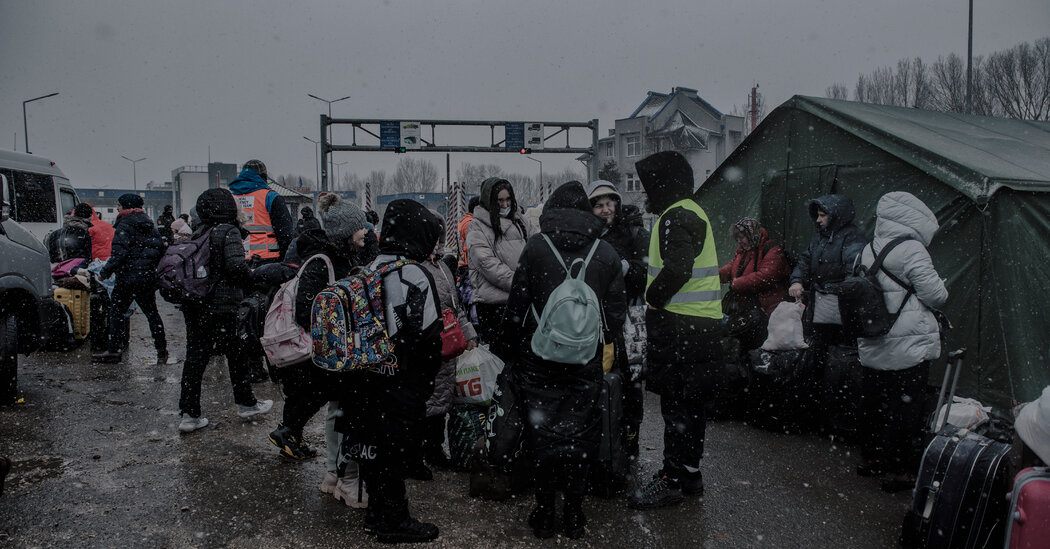
More than 18,000 voters in Texas’ most populous counties had their mail-in ballots rejected in the state’s primary election this month, according to a review of election data by The New York Times, a surge in thrown-out votes that disproportionately affected Black people in the state’s largest county and revealed the impact of new voting regulations passed by Republicans last year.
In Harris County, which includes Houston and is the state’s most populous county, areas with large Black populations were 44 percent more likely to have ballots rejected than heavily white areas, according to a review of census survey data and election results by the Harris County election administrator’s office.
The analysis also found that Black residents made up the largest racial group in six of the nine ZIP codes with the most ballot rejections in the county.
The thousands of ballot rejections, and the racial disparity in rejections in Harris County, provide the clearest evidence yet that the major voting law passed last year by the Republican-controlled Texas Legislature has prevented significant numbers of people from voting.
The rejection rate in the state’s most populous counties was roughly 15 percent. By comparison, during the 2020 general election, nearly one million absentee ballots were cast statewide and just under 9,000 were thrown out, a rejection rate of roughly 1 percent.
The numbers in Harris County, which has over 4.7 million residents, also appeared to substantiate Democratic warnings that Black voters would face the brunt of the new regulations.
The Texas law was part of a wave of similar voting measures passed by Republicans last year. The early effects in Texas could foreshadow future elections in the 18 other states, including major battlegrounds like Georgia, that tightened their balloting rules after the 2020 election.
“We have concrete evidence of the impact that it is having on primarily people of color,” Mayor Sylvester Turner of Houston, the second Black mayor in the city’s history and a Democrat, said in an interview. “People’s right to vote is being taken away. It’s almost like the 21st-century version of the poll tax, so to speak, when they were asked, ‘How many bubbles are in this bar of soap?’”
The number of Texas voters who cast mail ballots is relatively small, because only those over 65 or with a verified excuse may vote as absentees. But if high rates of rejected ballots carry over to future general elections, which have much larger turnout, the overall effect on voting could be far greater.
The vast majority of ballots were rejected because of rules set last year that required voters to provide their driver’s license number or partial Social Security number. Many either did not fill out the section on their ballot that asked for the identification number or had a different ID on file with election officials, and their ballot was rejected. Texas grants voters a limited window of time to address problems with their ballots in a process called “curing,” but The Times found that more than 18,000 were never fixed. (Voters could take their rejected ballots, if they received them in time, to a polling place to vote in person.)
Because Texas counties decide whether to hold a joint primary or separate party primaries, and only some counties report separate partisan turnout totals, it is difficult to assess any partisan advantage from the ballot rejections. In Harris County, for example, more than 3,800 rejected ballots were in the Democratic primary, and roughly 3,100 rejections were in the Republican primary. But the rate of rejection for Republican ballots in Harris County was higher, at 20 percent, than the rate for Democratic votes, which was 17 percent.
In Denton County, in the populous Dallas suburbs, 638 ballots were rejected in the Republican primary, or 20 percent of absentee ballots cast, and 262 were thrown out in the Democratic primary, roughly 10 percent.
Republicans in the Legislature last year heralded the voting bill as strengthening election security and argued that it would expand ballot access.
“By making it easier to vote and harder to cheat, we have dramatically improved elections across Texas,” Lt. Gov. Dan Patrick, a Republican who championed the law, said when it passed.
But the sharp rise in ballot rejections, coupled with what election officials across Texas said was a flood of voters calling them with questions, suggests that the state’s overhauled electoral process has confused thousands of voters and threatened to disenfranchise thousands more.
Mr. Patrick did not respond to questions about the increase in ballot rejections and the racial disparity of thrown-out ballots in Harris County. State Senator Bryan Hughes, the chief sponsor of the bill, also did not respond to questions. A spokeswoman for Gov. Greg Abbott, a Republican running for re-election this year, referred questions to the secretary of state.
Understand the Battle Over U.S. Voting Rights
Why are voting rights an issue now? In 2020, as a result of the pandemic, millions embraced voting early in person or by mail, especially among Democrats. Spurred on by Donald Trump’s false claims about mail ballots in hopes of overturning the election, the G.O.P. has pursued a host of new voting restrictions.
Sam Taylor, a spokesman for the secretary of state, said in a statement that the office had devoted a “significant portion” of its voter education campaign to the identification requirements for the absentee ballot process, including billboards, radio ads and social media posts.
“We are confident we will have all the information we need to apply any lessons learned during the primary to an even more robust voter education campaign heading into the November general election,” Mr. Taylor said.
But local election officials, who are barred by the new law from promoting voting by mail, said the voter education effort had missed the mark.
“Tell me how many seniors are on Twitter and I’ll tell you how many of them were actually helped,” said Isabel Longoria, the elections administrator for Harris County.
Ms. Longoria said that while she had expected higher rates of rejection because of the new law, she found the emerging racial disparity “shocking” and said it validated arguments from civil rights groups that the law would have an outsize impact on communities of color. (She will step down this year after her office initially failed to count 10,000 ballots in the primary election.)
Because demographic data is not a part of county voter rolls, the Harris County elections office analyzed demographic data from the American Community Survey of the U.S. Census Bureau in the top 30 ZIP codes that had the majority of ballot rejections.
The Times tallied rejected ballots in the 13 counties in Texas with a population greater than 400,000. The Associated Press conducted a broader survey of 187 counties and found that nearly 23,000 mail ballots had been rejected.
Ms. Longoria added that it was unlikely that many voters whose ballots were rejected would have been able to instead vote in person, meaning that they were most likely disenfranchised.
“This is not some kind of luxury or a perk for people that they engage in,” Ms. Longoria said of absentee ballots. “For some voters, it is their only option to vote.”
David Montgomery contributed reporting from Houston.




